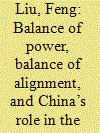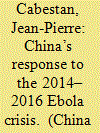| Srl | Item |
| 1 |
ID:
190663


|
|
|
|
|
| Summary/Abstract |
The Indo-Pacific region has become a central focus of great power competition. Not surprisingly, a rising China seeks to play an important, if not a leading role in the transformation of Asia’s present regional order. The United States, meanwhile, as the unipole, has strong incentives to prevent the rise of a peer competitor. Facing certain structural and domestic constraints, China is disinclined to resort to the strategy of violent revision or subversion historically pursued by previous rising powers. Instead, China has pursued a gradual change of the existing regional order through a combination of internal balancing and external reassurance strategies. Specifically, China’s quest for great power status in the region, particularly in response to the Indo-Pacific strategy adopted by the United States since the Trump administration, has prompted its proactive shift to counterbalance the US’ vision of order in the region. This paper argues that the balance of power and the balance of alignment constitute two key variables that affect the prospect of Sino-US competition for a preferable regional order. Beijing’s balancing strategies have significantly enhanced its economic and military capabilities, reducing the gap with the United States on the one hand and attracted certain regional states to join China-led regional initiatives on the other. However, owing to the complex balancing dynamics in the region and the agency of small and middle powers, the balance of alignment supports neither American nor Chinese dominance of Asia. Contrary to the ‘new Cold War’ narrative, the contest for order does not entail dividing the region into two rival blocs, but rather creating certain overlapping groupings and coalitions led by the two great powers. It consequently also signifies that the current order transition under a new bipolarity will be prolonged and relatively stable compared to the Cold War bipolarity.
|
|
|
|
|
|
|
|
|
|
|
|
|
|
|
|
| 2 |
ID:
178170


|
|
|
|
|
| Summary/Abstract |
The 2014–16 Ebola crisis in West Africa was China’s very first opportunity to demonstrate its willingness and ability to play a meaningful role in addressing public health emergencies of international concern. China’s decision to participate in the international response to the outbreak was part of an ambition to enhance its contribution to Africa’s security in general and health security in particular and to exert more influence on global norms. The specific role played by the People’s Liberation Army (PLA), especially its Academy of Military Medical Sciences, in Sierra Leone and Liberia is part of an ongoing effort to increase China’s involvement in international humanitarian assistance and disaster relief operations. It was the first time that it sent medical military teams to set up and operate infectious disease hospitals overseas. This participation also underscores the PLA’s crucial role in fighting epidemics overseas as well as at home, as the current COVID-19 pandemic illustrates. The Ebola crisis enables us to explore aspects of the PLA’s overseas missions, some of which are humanitarian and others which generally enhance China’s influence as a great power in Africa and in the world in the context of a growing Sino-US strategic competition.
|
|
|
|
|
|
|
|
|
|
|
|
|
|
|
|